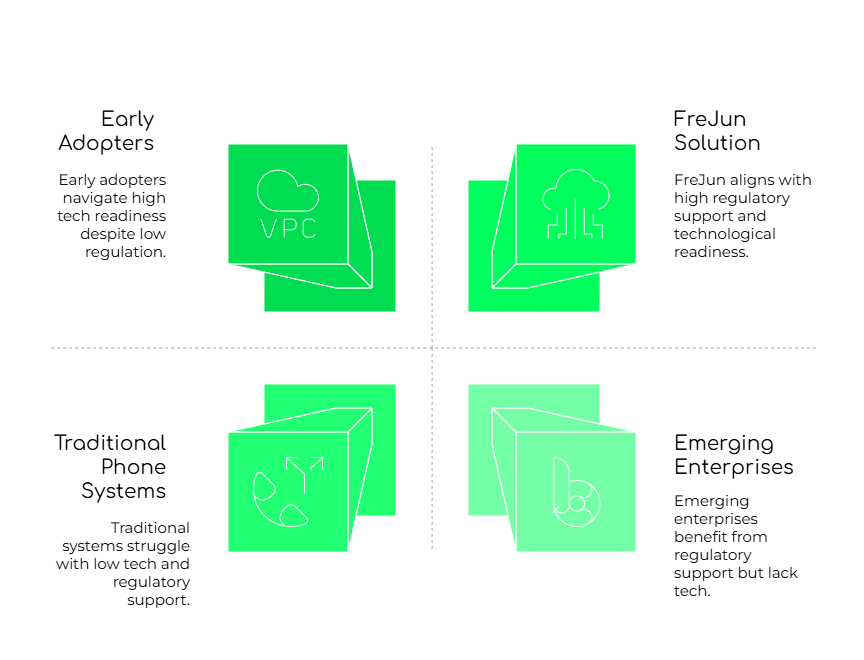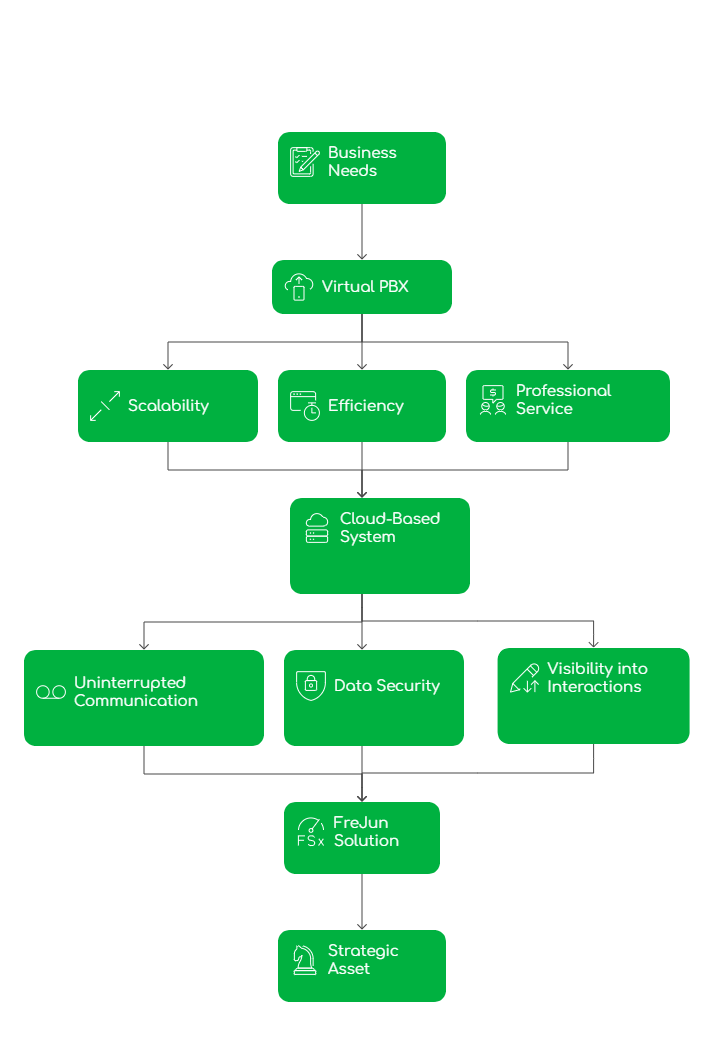Last updated on January 15th, 2026 at 12:00 pm
Are traditional phone systems still meeting the needs of fast-paced, modern businesses? For many enterprises in Thailand, the answer is quickly becoming “no.” As the digital landscape evolves and remote work becomes more prevalent, businesses need smarter, more flexible solutions for communication. Enter the Virtual PBX Phone System, a cloud-based phone system designed to reduce complexity, cut costs, and enhance team collaboration without the need for bulky hardware or physical infrastructure.
Virtual PBX systems offer a professional and scalable communication platform that enables enterprises to manage calls efficiently, whether teams are in-office, remote, or distributed across multiple locations. With Thailand’s growing digital economy and a national focus on improving customer satisfaction through smart technology, adopting Virtual PBX isn’t just a tech upgrade; it’s a strategic business move. It empowers organizations to stay agile, connected, and competitive in a fast-evolving commercial landscape, especially in sectors like retail, tourism, and services where responsiveness and reach are critical.
Table of contents
Why Enterprises in Thailand Are Switching to Virtual PBX?
Thai enterprises are increasingly switching to the Virtual PBX Phone System because of its efficiency and adaptability. With the rising trend of global clients and remote workers, traditional phone lines are proving to be restrictive and costly. A Virtual PBX Phone System offers a more intelligent solution, reducing the dependence on hardware and lowering overall communication costs.

Additionally, the National Broadcasting and Telecommunications Commission (NBTC) of Thailand has made it easier for businesses to transition by relaxing VoIP regulations. This legal clarity, coupled with improved internet penetration across Thailand, makes it easier than ever to deploy cloud communication systems. As a result, businesses are switching to Virtual PBX to future-proof their operations and remain competitive. FreJun offers a seamless and locally optimised Virtual PBX solution that aligns perfectly with these regulatory and technological advancements, making it an ideal choice for Thai enterprises ready to scale.
Understanding Virtual PBX Systems
A Virtual PBX Phone System (Private Branch Exchange) is a revolutionary step forward in business communications. Unlike traditional phone systems, the Virtual PBX Phone System is hosted in the cloud, allowing enterprises to make and receive calls using the internet. There is no need for complex wiring or on-premise infrastructure. This system can manage internal extensions, call routing, voicemail, and call forwarding across departments and locations with complete flexibility.

For Thai enterprises, a Virtual PBX system provides scalability without compromising efficiency. Whether businesses operate from multiple provinces or have a decentralized workforce, everyone stays connected on the same platform. This not only enhances customer communication but also supports hybrid work, which has become an essential model in Thailand’s evolving work culture.
Additionally, a Virtual PBX Phone System helps Thai businesses reduce operational costs by eliminating the need for physical hardware and maintenance. With centralized control, real-time analytics, and customizable call flows, enterprises can streamline their communication strategy while adapting quickly to customer needs and market demands. Many enterprises also use diagrams, dashboards, and royalty free images in internal documentation to help teams quickly understand call flows and system architecture.
Essential Features of a Modern Virtual PBX
A reliable Virtual PBX Phone System must include features that support both internal team collaboration and external customer communication. This includes seamless call routing, voicemail-to-email, call recording, IVR menus, and integration with tools like CRMs, ensuring that businesses maintain professionalism, responsiveness, and operational efficiency at every level.

- IVR (Interactive Voice Response): Virtual PBX systems offer advanced IVR menus that allow callers to interact using a keypad or voice prompts. This feature helps route each call to the correct department or agent instantly, reducing wait times and improving customer satisfaction.
- Voicemail-to-Email: Every missed call leaves a voicemail that is automatically converted to an audio file and sent to the recipient’s email. This ensures that no customer message goes unnoticed and allows teams to respond quickly, even when away from the phone.
- Real-Time Analytics Dashboards: Managers can monitor key call metrics like call duration, response times, and drop rates. These dashboards provide actionable insights to improve staffing decisions, identify communication gaps, and maintain service quality.
- Seamless CRM Integration: Integration with CRMs like Salesforce or HubSpot allows customer data to sync automatically. Call details, notes, and outcomes are logged in real-time, helping teams maintain accurate records and streamline follow-ups.
- AI-Enabled Call Recording: All calls are securely recorded and stored with AI-powered keyword identification. This not only supports compliance and training but also helps in identifying trends or frequently mentioned concerns during customer interactions.
Step-by-Step Setup Guide for Thai Enterprises
Getting started with a Virtual PBX Phone System doesn’t have to be overwhelming. Thai enterprises can simplify the process by following five clearly defined phases, each focused on aligning technical setup with business goals.
Phase 1: Planning and Objective Mapping
Define clear objectives before starting the implementation. Whether the goal is to improve customer support or expand call-handling capacity, outlining the desired outcomes gives structure to the setup. Evaluate current pain points, customer wait times, or the cost of traditional systems.
Phase 2: Network and Device Assessment
Check current network capabilities and endpoints. A minimum of 100 kbps per concurrent call is needed for stable call quality. Also, assess whether existing devices such as laptops, headsets, and mobile phones can support VoIP, or whether IP desk phones are required.
Phase 3: Vendor Selection and Onboarding
Choose a service provider who understands the Thai market and can support your regulatory and language needs. FreJun simplifies onboarding by offering local expertise, plug-and-play tools, and direct CRM integrations that speed up deployment.
Phase 4: Team Training and Pilot Launch
Provide short training sessions for staff to get familiar with the new system. Create a pilot team from different departments to test all features. FreJun offers video tutorials and quick-start guides to help teams adapt quickly without slowing down daily operations.
Phase 5: Full Launch and Optimization
Launch the system organization-wide after resolving feedback from the pilot. Use built-in analytics and AI from FreJun to monitor performance and uncover areas for optimization. Revisit call flow settings, add automation rules, and ensure all teams are aligned.
Choosing the Right Provider in Thailand

Finding a Virtual PBX Phone System provider who meets both local regulatory requirements and specific business expectations is essential for long-term success. Thai enterprises should focus on providers who understand regional needs, offer localized features, and comply with national data regulations.
- Ensure servers are based in or close to Thailand for low-latency connections
- Look for PDPA-compliant providers with security certifications
- Confirm Thai-language customer support is available during local hours
- Verify that the platform integrates easily with sales, marketing, and HR tools
- Choose FreJun for its seamless user experience, regional expertise, and enterprise-grade features
Key Takeaways
By moving communication to the cloud, businesses eliminate the need for on-site hardware and enable teams to work from anywhere, whether in Bangkok, Chiang Mai, or beyond. In an era where remote work, hybrid teams, and rising customer expectations are becoming the norm, organizations can no longer afford the limitations of outdated infrastructure. A Virtual PBX Phone System empowers businesses to maintain a professional image, deliver prompt customer service, and adapt quickly to market changes. It reduces operational complexity while improving control over call flows, analytics, and team collaboration, ultimately creating a future-ready communication environment.
FreJun delivers a next-gen PBX system that’s precisely aligned with Thailand’s evolving digital business needs. Its cloud-based platform integrates advanced AI-powered tools, real-time analytics, call recording, and mobile accessibility into one seamless experience. Whether managing remote teams, analyzing customer interactions, or integrating with CRM tools, FreJun enables Thai enterprises to stay agile, efficient, and highly responsive. This strategic advantage supports national goals for digital competitiveness and helps businesses enhance service quality, strengthen internal collaboration, and scale operations with confidence, especially in line with Thailand’s roadmap for a smart, connected economy.
Final Thoughts
In Thailand’s fast-paced economy, businesses need communication systems that adapt just as fast. Virtual PBX gives companies the advantage of scalability, efficiency, and professional service without traditional infrastructure constraints. This is not just an upgrade, it’s a necessary evolution for digital competitiveness.
A cloud-based system ensures that enterprises can continue operating smoothly, regardless of where teams are located. Communication remains uninterrupted, data stays secure, and teams gain visibility into every customer interaction.

FreJun’s enterprise-friendly model offers a one-stop solution that aligns perfectly with the evolving needs of Thai businesses, from fast-growing SMBs to large corporations. Its flexible and cloud-based approach eliminates the need for heavy infrastructure while ensuring seamless communication across teams, departments, and regions through a powerful Virtual PBX Phone System.
Further Reading – US VoIP Number Implementation for International Trade in Saudi Arabia
FAQs
FreJun offers guided setup, simple interfaces, and expert support to help even first-time users set up their system within hours. Everything is cloud-based, so there’s no technical hardware to install or configure.
FreJun provides a flexible and scalable solution. Adding more users, numbers, or departments takes just a few clicks and doesn’t require any additional infrastructure.
Yes. FreJun’s cloud-based dashboard connects all offices and remote workers under a single account. The system includes unified call routing, reporting, and call monitoring tools.
Absolutely. FreJun integrates with leading CRM platforms so that call data syncs with customer records in real-time. This minimizes manual entry and improves team efficiency.
FreJun provides detailed reports, real-time call logs, and AI-powered insights that show team performance. Managers can use these insights to coach employees and optimize service.

